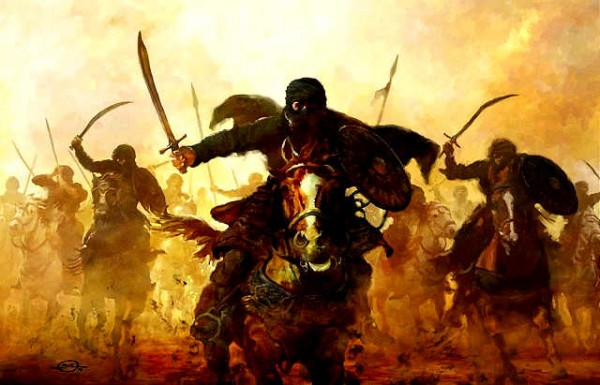The Khawarij, the forefathers of today’s violent extremists
by http://lostislamichistory.com/
Throughout Islamic history, groups have arisen from time to time advocating radically new and divergent ways of thinking about the religion. One of the most radical and violent of these groups emerged during the political mayhem of ‘Ali’s caliphate, which lasted from 656 to 661.
Known as the Kharijis, they emerged from a radical political position and went on to develop particularly extreme beliefs that put them at odds with most Muslims. While they never became a major political or religious force in the Muslim world, they had major impact on their own times and their ideology has been replicated numerous times by other fringe groups throughout the past 1400 years.
Background
Also Read: The Forty-Four-Days of Glory: Azerbaijan’s Struggle for Justice and Peace
In June of 656 CE (35 After Hijra), the caliph of the Muslim Empire, ‘Uthman bin ‘Affan was assassinated. The killers were a group of discontented Muslim Egyptian soldiers, who took issue with a ruling ‘Uthman made in a case between them and the governor of Egypt. Unlike the previous two caliphs, Abu Bakr and ‘Umar, who left behind at least some guidance as to how to pick a new caliph (Abu Bakr simply appointed ‘Umar while ‘Umar appointed a council of six to choose one of their own), ‘Uthman had not left behind a framework to choose a new caliph.
The assassins, who now held effective control in the capital, Medina, wanted ‘Ali to be the new caliph. ‘Ali naturally resisted such an appointment by murderers. Accepting the nomination could be construed by others as his implicit approval of the rebels’ actions, which couldn’t be further from the truth considering that he sent his own sons to defend ‘Uthman when the rebels barricaded him in his house.
But when some of the leading members of Medina’s community told ‘Ali that he was the Muslim nation’s best chance at peace and normalcy, especially considering his status as the Prophet’s ﷺ cousin and son-in-law, he reluctantly took on the title of fourth caliph of the Muslim Empire.
The extent of the Muslim world during the caliphate of ‘Ali. The areas held by Mu’awiya are shaded in light green.
Also Read: Palestine Solidarity Month: A Collective Movement for Al-Aqsa and Palestine’s Freedom
He did, however, have some immediate opposition. Mu’awiya, the governor of Syria, was a cousin of ‘Uthman. He was ready to pledge allegiance to the new caliph so long as ‘Ali tried and punished the rebellious Egyptian soldiers who killed ‘Uthman. ‘Ali, however, did not believe doing so was in the interests of the Muslim nation. He certainly did not approve of the soldier’s actions, but punishing them could bring about an even bigger revolt, leading to more bloodshed and trials for the young Muslim Empire, which ‘Ali was keen to avoid.
Without Mu’awiya’s support, however, ‘Ali was left without one of the largest and most prosperous provinces of the empire. Mu’awiya was intensely popular in Syria. He had been the governor there since the caliphate of ‘Umar, and did a good job of prudently managing the relations between the region’s native Christian population and the newly introduced Arab Muslims. ‘Ali, in turn, had strong support in Iraq, particularly in the city of Kufa, where his supporters were incensed at Mu’awiya’s refusal to pledge allegiance.
In order to avoid an eventual civil war between Mu’awiya’s Syrian supporters and Ali’s Iraqi ones, the two men agreed to an arbitration. They figured allowing a third party to mediate the dispute and find a solution, and potentially a new caliph, would be a peaceful end to a perilous political divide.
But ‘Ali encountered an unforeseen problem with his arbitration. Some of his supporters were so convinced that he was right in his choice not to pursue justice for ‘Uthman’s murderers, that they were enraged at his choice to go to arbitration. To them, ‘Ali had committed a major sin by agreeing to deal with Mu’awiya. They seceded from ‘Ali’s camp and became known as the Kharijis (also known as the Khawarj or Kharijites), meaning “those who left”.
Also Read: Hassan al-Turabi: A Controversial Thinker from Sudan
Khariji Ideas
The development of Khariji ideas is an interesting lesson in how political ideas can lead to new divergent ideas of Islam (a similar political to religious process would form Shi’ism in later years). The Khariji political position that ‘Ali made a mistake morphed into a belief that any and all people who commit sins are unfit to rule. This alone was a particularly extreme idea, but it didn’t end there.
Eventually, the Kharijis argued that sins themselves were a form of kufr (disbelief in God). They argued that if you commit a sin, you are in effect a disbeliever in God and thus could be fought and killed, even if you were a Companion of the Prophet ﷺ or a caliph. Furthermore, if you disagreed with their belief that sins are disbelief, you are by default a disbeliever and could be fought and killed.
Khariji beliefs did not have much basis in actual Islamic theology. Takfir (declaring people disbelievers) is in fact a very specific and rare thing in mainstream Muslim belief, with the majority opinion, as stated in the‘Aqida of Imam al-Tahawi, being that the only thing that invalidates someone’s status as a Muslim is openly declaring that they do not believe that there is no God but Allah and that Muhammad ﷺ is His messenger.
Also Read: Who Exactly is the RSF Group Shaking Sudan?
Thus most of the Kharijis were not educated people well versed in the Qur’an and the sayings of the Prophet. The majority were desert Bedouin raiders who made up for their lack of understanding of Islam with a strong zeal for Khariji beliefs, no matter how intellectually shallow they were.
Khariji ideas never took hold with the general population. Besides being a distortion of the Prophet’s teachings, Khariji beliefs were simply too extreme for most people to be on board with. But that didn’t stop the small group of Kharijis from having a major impact on the Muslim world.
In line with their beliefs, Kharijis attempted to assassinate all the political leaders who took part in the arbitration that led to their establishment. They failed in their attempts to kill Mu’awiya and ‘Amr ibn al-’As, who supported Mu’awiya and ruled Egypt in his name. But in 661 they succeeded in killing the caliph, ‘Ali, in Kufa. The assassination of the Prophet’s cousin and son in law brought about the end of the Rashidun era of the caliphate and the beginning of the Umayyad Caliphate, led by Mu’awiya.
The Kharijis continued to be a nuisance for the Umayyad and Abbasid caliphates for centuries. They never came to hold major cities in their numerous rebellions, but would use their familiarity with the deserts to roam throughout the Muslim world, harassing and terrorizing populations that did not accept their beliefs. In North Africa, they managed to get some support for their cause from groups of indigenous Berbers by playing off of the tensions between them and the ruling Arabs.
Also Read: The Two-State Solution (Palestine–Israel) in Historical Perspective
Eventually, the Khariji movement would die out slowly, a victim of its own extremism that prevented it from ever being accepted by most Muslims. One strand of them managed to moderate to some extent and developed into the Ibadi sect, which today forms the majority of Oman’s population. But while the Khariji movement itself did not last, their concept of takfir of sinners has been resurrected from time to time by numerous extremist groups, even being echoed by some modern political movements. (T/muslimvillage.com/P3/R01)
Mi’raj Islamic News Agency (MINA)
Sources:
1.http://muslimvillage.com/2014/09/08/57598/the-khawarij-the-forefathers-of-todays-violent-extremists/
Also Read: Enchanted by K-Dramas, Dragged into Slander: Time for Muslims to Rise!
2.kharijis/" target="_blank">http://lostislamichistory.com/


































 Mina Indonesia
Mina Indonesia Mina Arabic
Mina Arabic